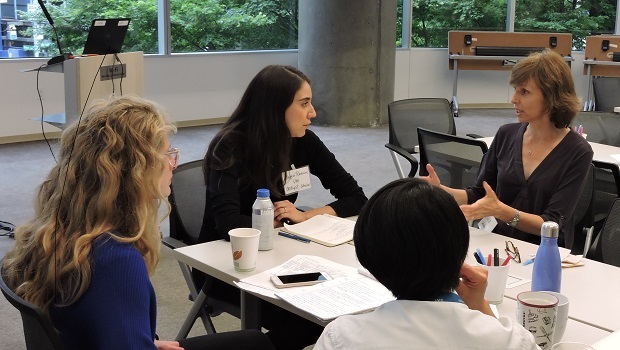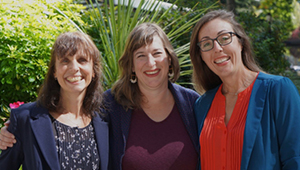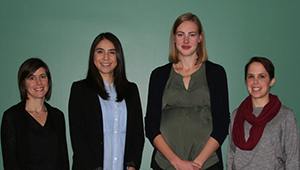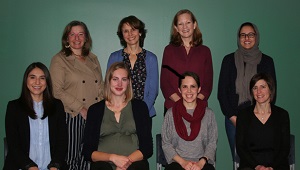CATALyST meeting sparks learning for health care transformation

CATALyST Scholar Maggie Ramirez, PhD (left), with the program’s co-director, Paula Lozano, MD, MPH, and others, at its first annual Learning Health System Research Symposium.
With a focus on learning health system research, scholars and faculty from the program’s four institutions shared insights and support
What do you get when you bring together a group of learning health systems (LHS) researchers in one room for a day? The first annual CATALyST LHS Research Symposium—a cross-pollinating event where faculty from the four participating CATALyST program institutions (Washington State University, the University of Washington, the VA Health Services Research and Development, and Kaiser Permanente Washington Health Research Institute), shared experiences from their work as embedded researchers.
Hosted by KPWRHI on May 20, the CATALyST Symposium, was designed to engage participants in learning about successes and challenges in the design, execution, and outcomes of learning health system research in different settings. The symposium also aimed to start building a community of LHS research across Washington State.
“We designed the Symposium with an interactive format that enabled attendees from multiple institutions and disciplines to engage in meaningful discussions and learn from colleagues doing LHS research,” said Paula Lozano, MD, MPH, co-director of the CATALyST K12 Scholar Program. “We were thrilled to see the LHS research community welcome our four inaugural CATALyST K12 scholars with open arms. This culture of collegiality and collaboration is a key component of our K12’s training program. It’s a great way to support our scholars’ career development and empower them to transform health care.”
Faculty shared lessons learned in implementation and de-implementation of health care practices and the use of data and analytics for embedded research and practice transformation. Each panel was followed by facilitated discussions in small groups, designed to promote idea-sharing and relationship-building.
Symposium takeaways included:
- Researchers should expect a perpetually-evolving LHS research environment.
- The stakeholder-researcher relationship is pivotal to impacting system change in a meaningful way.
- Checkbacks with stakeholders and the delivery system, even after change implementation, is critical for sustainability.
- The patient voice and preference in LHS research is an essential ingredient of success.
Scholars and faculty alike came away from the event having forged new connections, learned new ideas, and solidified their understanding of the breadth and depth of learning health system research.
Linnaea Schuttner, MD, one of the four CATALyST scholars and a VA physician reflected on the event: “The networking possibilities were invaluable; it was great having the chance to meet nationally renowned researchers from the area, hear about their work, and connect with them over shared interests in learning health systems.”
More LHS learning opportunities are on the horizon, including semi-monthly works-in-progress meetings. Researchers and learners wishing to attend or present at such events should contact CATALyST Program Administrator, Susan Brandzel: susan.x.brandzel@kp.org.
ACT Center

New center focuses on equitable, whole-person health care
Kaiser Permanente launches the Center for Accelerating Care Transformation.
scholar program

CATALyST K12 Scholar Program
Learn cutting-edge LHS research methods from experienced learning health systems in Washington state.
Learn more in Careers.
future research leaders

Four CATALyST scholars selected to train as learning health system scientists
KP Washington joins forces with UW, WSU, and the VA to train scientists in transforming health care.


